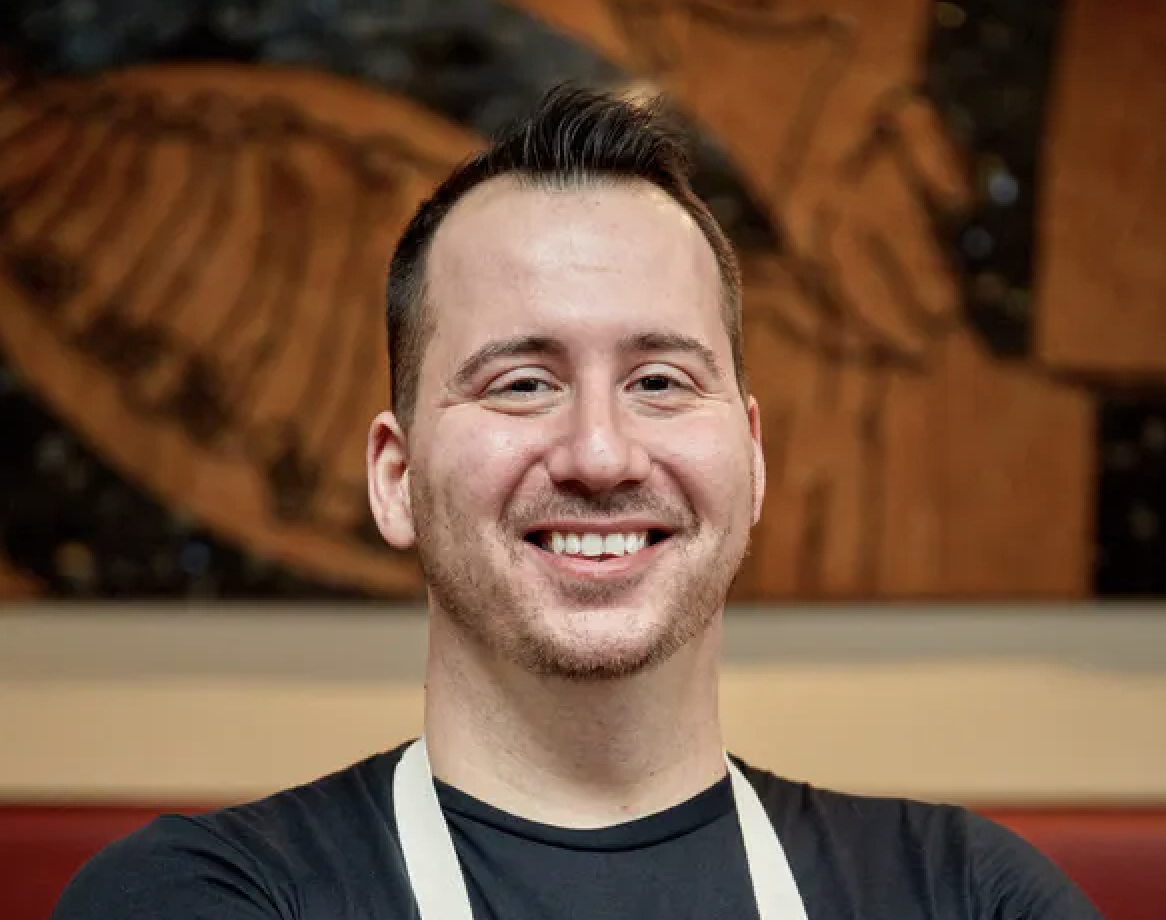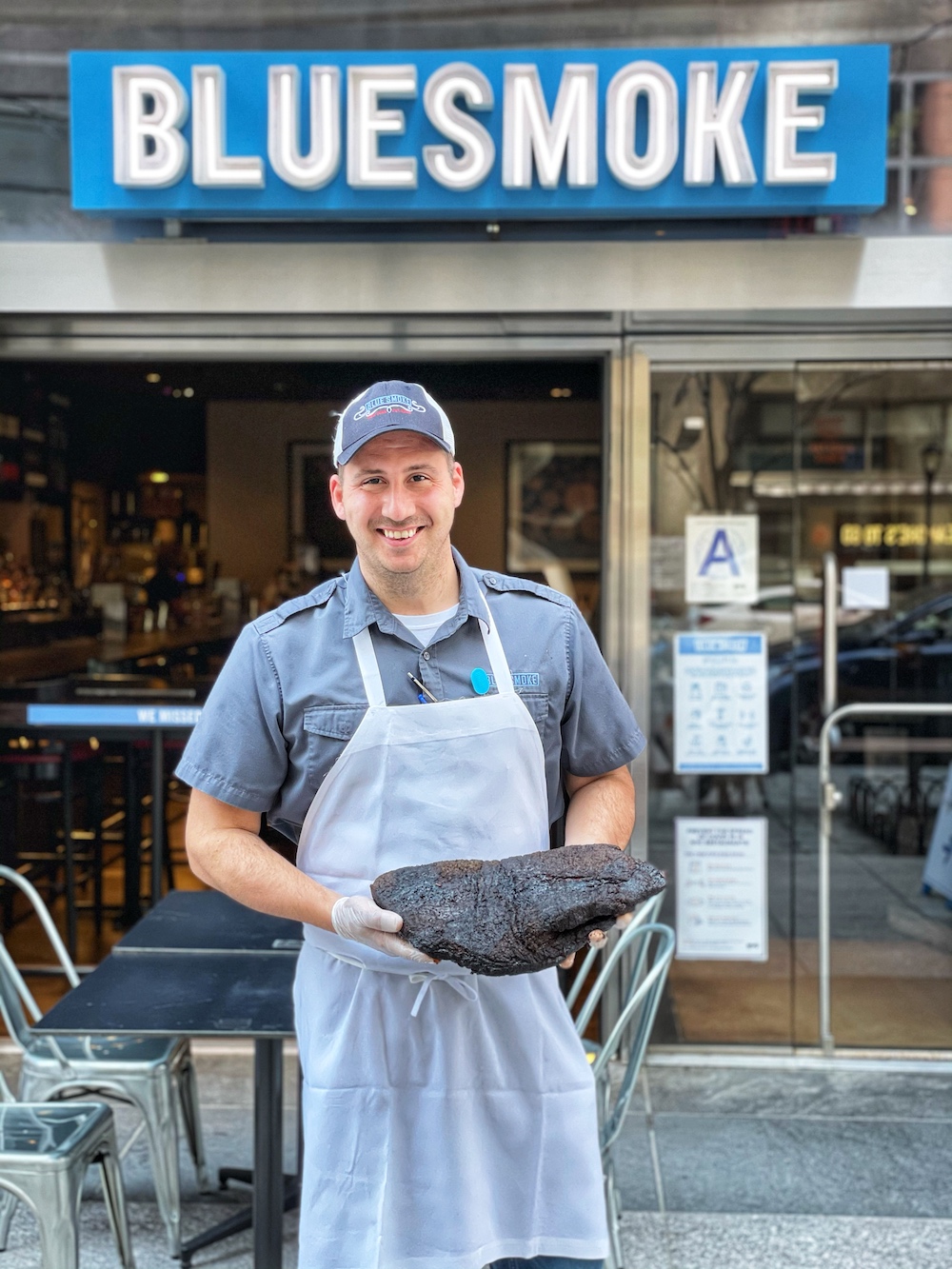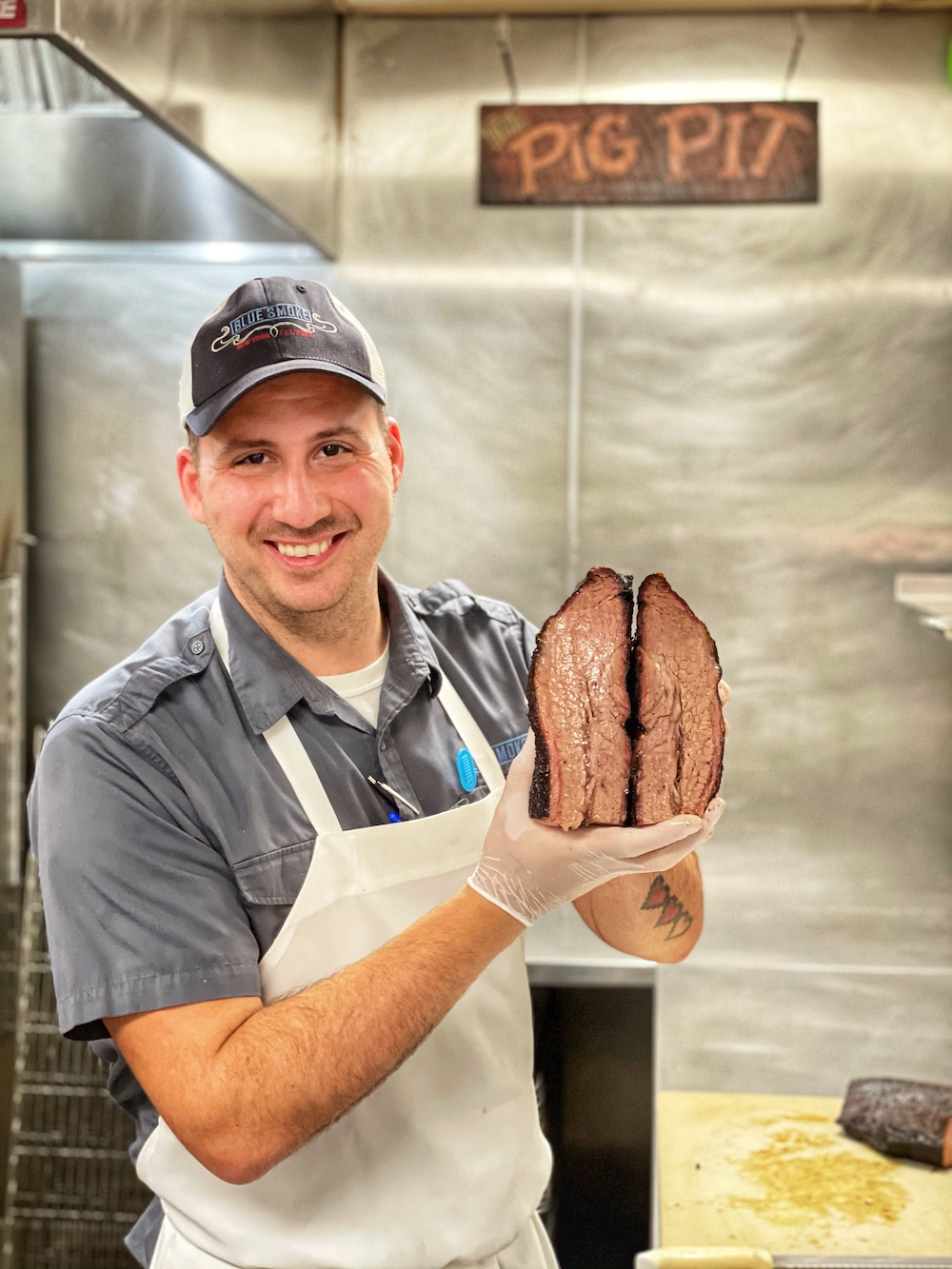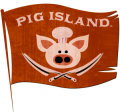Bret Lunsford went from idolizing chefs playing with molecular gastronomy in culinary school to executive chef at Blue Smoke, one of the most important barbecue joints in New York City. For almost two decades, Blue Smoke has provided New York City with serious smoked barbecue, and Bret is upholding the tradition through the pandemic. We spoke with Bret about some of the many front and back of house positions he’s held at restaurants during his career, the good and bad that has happened in the last year and what he’s looking forward to at Brisket King. Blue Smoke is open for indoor and outdoor dining plus pickup and delivery in Battery Park City and for nationwide delivery on Goldbelly. For a guaranteed taste of Bret’s brisket, buy your tickets to Brisket King now. As told to Sarah Strong, this interview has been edited and condensed for clarity.

Food Karma: What did Blue Smoke do at the beginning of the pandemic?
Bret Lunsford: We started getting some sort of messaging a week before. Covid started becoming bigger and bigger in the news, and more and more people were aware of it. Everyone was watching CNN and standing by, waiting to see what was happening. We got the message on the 13th that we were going to go ahead and close that day and that we’d probably be shut for about two weeks, which was the average messaging that most people got.
We had all this meat cooked and we couldn’t let it go bad, so we gave it away. We had a line. I was like, “who wants brisket, who wants spare ribs, who wants baby backs?” We were giving meat out to people in the neighborhood, to staff, to teams. Anything we could save, we saved, obviously, but that was that. The anticipation was to shut down for two weeks and for us to stay on call, ready to see what had to happen and to jump in on other restaurants, move things around, clean, deep clean on those days off and just get ready to reopen by the end of March. It did not go that way.
USHG in general had to lay off the majority of our staff – all of our hourlys and a lot of management. We went from thousands of employees down to about 75 total within the entire company. We all worked from home and did Zoom calls and reimagined our restaurants: what could they be, what should they be, what can we do to make money still, how long is this going to be? We really didn’t know, so we were just taking the time to reevaluate, take a step back and prepare to relaunch again whenever that might be.
We decided that Battery Park City would be the better spot to open from first, and so we opened back out of BPC on my birthday: June 11th of 2020. I got to celebrate with a Blue Smoke brisket sandwich. It felt great. Even though it was just takeout and delivery, it was just great getting food to the community again and being there and letting people know that restaurants are going to try to do what we can do to provide during the pandemic.
Then patio dining started happening, so we did that over the summer and into the fall. Then it got cold and we could have indoors, so we did the indoor at 25%. When we got shut down again, we shut down again and did takeout and delivery only. We were nervous with the patio because there were a lot of rules and a lot of regulations put out there about what type of structure you can have. Then we also have our building to worry about with Goldman Sachs and different people in our neighborhood want their neighborhood to look a particular way, so we have to go within those guidelines. We decided it would be best to operate as a takeout restaurant until we could do patio service when the weather got nice again.
We were scheduled to open up April 8 for indoor/outdoor and then we we decided we could move it up a week and then we said we can move it up another week, so we moved it up to March 25th and we are now reopen for indoor and outdoor dining in Battery Park City.
In Flatiron, unfortunately we could not come to an agreement with our landlord during the closure, so we had to part ways, which is real sad because we opened up Blue Smoke and The Jazz Standard in 2002. That was our flagship. Blue Smoke celebrated our 19th birthday, and it’s sad to know that that location is not there. There’s a lot of great memories, and a lot of movement in the barbecue world happened because of that restaurant. To see it closed is sad, but our flame is still burning as it were down in BPC, and we’re gonna keep going, which is why I’m so excited to be a part of Brisket King. It’s an opportunity to say that Blue Smoke is still here, and we’re still doing serious barbecue.

FK: You’re now an executive chef, but you started your restaurant career in front of house positions, correct?
BL: If we want to go way back, Sonic Drive-In is technically my first restaurant job. I worked for a seafood spot moving crawfish around, but that didn’t last long. I started serving tables at Outback Steakhouse and worked with Outback during college. When I moved for grad school I transferred Outbacks there, and after that I moved to Orlando and kind of did the same thing. I worked some front of house, but I also did some stints in the back of house which gave me my first taste of the kitchen.
I went to the Culinary Institute of America in 2011, graduated in 2013 and came to the city. I started at Gramercy Tavern in May of 2013 and I worked there for a little over two years, going through the stations. Then I went to Untitled at the Whitney to open up that restaurant. I was there for about six months and then I decided I was done with the kitchen, that I hated it and wanted to have more of a normal life. I wanted to wear business socks so I was looking at people in the company asking how they get there, what did they do.
I had a friend who was actually at Cornell at the time so I thought maybe I’d go up there. There was a program that in essence would let me go for free, because I definitely couldn’t take out more student loans. I decided to leave back of house and go to front of house, and so my old roommate and friend happened to be a manager at Blue Smoke at the Flatiron location. He said, “You have server experience, you know this company, just come here and serve tables until you figure yourself out.” That sounded good, so I did that and I became a server at Blue Smoke in 2015 for about six months.
I went back to Gramercy to work the meat roaster station, to be the saucier in the morning, which was a position that I really, really wanted to do. We had the 25th anniversary party for Gramercy Tavern and the Blue Smoke chef de cuisine Alex Harris was at that party. I had worked with him as a server, and we would talk food. He would come to pre-shifts, or as we call them at Blue Smoke smoke signals, and would talk about different dishes and techniques. I went to culinary school, so I was able to answer the questions. I was a cook who became a server, or a server who became a cook who became a server, so I was able to answer questions that others could not, and he liked that. At this party he asked if I was ready to be a sous chef yet, and I very much wanted it. I went in for a tasting and got the job.
I joined Blue Smoke officially as a chef in 2016 and worked my way up to executive sous chef and then culinary director. I was named executive chef in September of 2019 officially and have gotten to bring Blue Smoke through the covid times, which is a challenge and an honor. It’s been great and it’s been terrible, all at the same time.
FK: Growing up in the South, did you have much experience with barbecue?
BL: I was born in Atlanta but I lived there for about six weeks, so it doesn’t really count. I moved to Texas, which is where my dad is from, and I was there for about 13 years. I was definitely surrounded by barbecue. I have memories of eating barbecue in Central Texas with my Pawpaw, eating brisket and raw onion. My godmother’s sister’s husband Roberto would always smoke briskets for Easter Sunday. My dad had a smoker in the backyard. He was never one to smoke large format, he never did brisket or pork, but he would definitely grill steaks all the time, grill pork loin and pork chops and chicken hearts. I remember always being really impressed by daring to eat that. He would also smoke chickens a lot. We actually have a menu item called the Backyard Chicken which is inspired by memories of my dad smoking and grilling chickens in the backyard.

FK: What have you learned about cooking and yourself as you transitioned from fine dining to barbecue?
BL: It’s been a journey of self discovery. Going to school, I always had intentions of being the next Ferran Adriá or Grant Achatz. I wanted to revolutionize the culinary world. I love molecular gastronomy, so everything will have a foam and everything will have a sphere and I will hang bacon from clothes lines or whatever people are doing. Then I went to more fine dining at Gramercy, which is an honest fine dining style.
Gramercy is very natural oriented, very vegetable forward, simple cooking techniques, not a lot of agar agar or things like that, very straightforward, classic technique, which I really enjoyed. Then people like Sean Brock started getting a lot of attention. I asked myself if you can do fine dining Southern, something I’ve always been interested in. I would always cook southern items for family meal. I would do red beans and rice or gumbo or fried chicken.
When I went to Blue Smoke, at first they mentioned that they were thinking of turning it into more of an upscale restaurant. That’s what I do, so I went to Blue Smoke thinking that, and it quickly became clear that wasn’t the direction we were going to head in. It took me a moment to decide if this was what I wanted to do still, but the more I work with barbecue and meat people in the barbecue industry, the more I appreciate it and I respect it.
Barbecue is one of those foods that people from all different walks of life can gather around and enjoy. It’s a poor person’s food to start with, it has humble beginnings, and I really like that. I was not raised wealthy, we were lower middle class. To be able to cook and to give food to people who can afford that and to do that instead of people who want to go out and have a sixteen course fine dining meal with micro greens and foams and flying bacon or whatever, I take a lot of pride in being able to do humble food, to execute food simply and honestly and try to get people a piece of history and a piece of home.
More than anything to me, Blue Smoke is a lot like coming home. That’s the feeling I want to evoke with my food and Blue Smoke. It could be like coming to granny’s house, but when she’s expecting company, when she puts the good china out, but it still has that simple, humble underlying message to it that should hopefully give you a sense of love. You should feel that you’re being cared for when you’re eating the food.

FK: Have you made a lot of menu changes since you took over or during the pandemic?
BL: Yes and no. It’s been tweaking more than anything. The best thing, if i had to say, that came from the pandemic is I was able to break down the menu and to really look at everything. We started back up very small with only cornbread muffins, macaroni and cheese, cole slaw, pulled pork and brisket. With that, I really got to dive deep into what’s the best way to butcher, what’s the best way to season, do we still want to do this, what was it originally?
Blue Smoke, as we said, has been open now for 19 years, and there have been several different chefs that have come through and have put their mark on it. I really took the time to work with our team to think about what Blue Smoke means today and what we want it to mean moving forward. When Blue Smoke first came to the city, there wasn’t really a barbecue option. When Blue Smoke came in it was more of a place of education for people: we taught people what Texas brisket, Carolina pork, Kansas City ribs, Kentucky lamb were. All these different things and all these different styles of barbecue came to Blue Smoke.
Pitmaster Mike Mills of 17th Street BBQ worked with our opening team. We went out to 17th Street BBQ, and Mike was kind enough to teach us everything he knew. He gave us his barbecue sauce recipe and his rub recipe and worked with us. I really wanted to pay respect to that.
I was fortunate enough to go right before the pandemic and take a tour. I went to Memphis and to St. Louis and then up to 17th Street BBQ. I got to eat and work for a day or two with Mike and Amy Mills and really solidify those bonds that we have together. With his passing in late 2020, it’s more important to me than ever now to really respect our beginning at Blue Smoke and those people who taught us what we know and who paved the way for us. So I don’t want to tweak too much.
I got to dive deep and really fine tune everything in a way that I wouldn’t have had the chance to otherwise. Before, we had people who were pitmasters for years and years and years people who were here from the beginning making our deviled eggs, people who were here from the beginning butchering our brisket, so Icould watch them and kind of learn from them, but I was never really in a position where I needed to do any of it. I was more of a leader and less of a pitmaster as it were. I would tell my staff what needed to happen and just run the show. But with everybody gone, it was just me, I was the only person in the back of house. I got to figure it out and learn and train myself.
I would say at least 90% of the recipes at Blue Smoke are still pretty close to the originals. I would never touch the mac and cheese, our pork is done the way that we were trained, our ribs are done the way that Mike showed us. I’m trying to pay respect to the people who have been coming to Blue Smoke and the people who helped make Blue Smoke what it is today.
FK: What are you looking forward to?
BL: I’m most excited just to say that Blue Smoke is still here. I’m excited to get to Brisket King and get involved more with the New York barbecue scene as a whole. I don’t think Blue Smoke has done our best work in the past couple of years of being a good partner with other spots like Pig Beach or Hometown or even Hill Country. I would love to have a closer relationship with them, so I’m looking forward to getting to say hello and introduce myself to people as the new leader of Blue Smoke and to let people know that, like I said, Blue Smoke is still here. We are in essence kind of the reason why all these other restaurants are here today because of the work that Blue Smoke did to kind of begin the revolution of barbecue in New York with Big Apple Barbecue everything else that went down at Blue Smoke.
